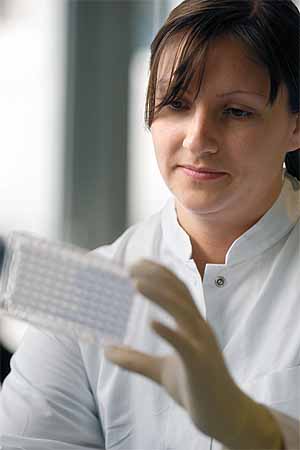Bavarian Nordic
Bavarian Nordic has a healthy look
Bavarian Nordic, a leading international biopharmaceutical company, develops vaccines to prevent diseases such as smallpox, HIV and cancer. Headquartered in Kvistgård, Denmark and with operations in Germany, the US and Singapore, Bavarian Nordic is one of a handful of companies in the world able to meet the increasingly high demand for safe smallpox vaccines.
The company’s patented technology, MVA-BN, is one of the world’s safest, multivalent vaccine vectors for protection against various diseases: “We’re fundamentally a research company with ten clinical projects at the moment,” explains vice president of investor relations and communications, Rolf Sass Sorensen. “The three main areas we focus on are smallpox, HIV and cancer but we research tropical and childhood diseases as well. Our key project in clinical Phase II is smallpox and we’re got three projects in HIV, of which two are in Phase II and one is progressing to that stage next year. Our breast cancer project is in Phase II, the prostate cancer project is entering Phase I, and we have four others in measles, Japanese encephalitis, dengue fever and respiratory virus. Our safe and fast acting MVA-BN vaccine is the platform we use for all of these.”
Alongside its Kvistgård facility, Bavarian Nordic has sites around the world to optimise research capabilities with German facilities in the European biotechnology region of Martinsried, Munich and the Max-Delbrück-Center biotech campus north of Berlin. The US site, BN ImmunoTherapeutics Inc., that focuses on cancer, is ideally located in Mountain View, California, to collaborate with nearby leading universities in cancer immunology.
Advanced clinical development to develop Bavarian Nordic’s vaccine, Imvamune, as a safe third-generation smallpox inoculation has been expedited by the US Government in a contract worth $1.6 billion. Rolf explains how this pioneering research is progressing: “Imvamune will be marketed to government officials and healthcare operatives around the world. Having been eradicated, smallpox has been revitalised due to risks from bio-terrorists who recognise its low cost and stability. Alongside anthrax, smallpox is considered by all agencies around the world to be incredibly dangerous. We began the process in 1992 and received $29 million from the US government for development, which was followed up in 2004 with a $100 billion contract after we manufactured 500,000 doses. This year we received the latest contract requiring 20 million doses which have a value of $500 million. A priority at the moment is completing a $1 billion aspect of the contract which calls for an additional 60 million doses and an investigation into the vaccine’s effects in immune compromised people such as HIV patients, the elderly and children, who cannot use the current vaccine due to serious side effects. There is an optional part of the contract that the US Government is able to chose to exercise and is worth $1.2 billion.”
The company’s affiliation with the US Government is a major factor contributing to its success, explains Rolf: “This contract is the ultimate goal for any biotech company and having our own state-of-the-art manufacturing site was crucial in winning it because we control every step, monitoring all operations from R&D and production to sales and marketing. The fact that we own our patented MVA technology and were the first to have a breakthrough is also key. This contract affirms our technology, which paves the way for receiving new orders outside the US.”
By cultivating a partnership with German vaccine producer Impfstoffwerk Dessau-Tornau (IDT) and opening a $75 million plant in Kvistgård, the company ensures the supply of its vaccines: “Our new site is an excellent manufacturing facility for MVA production,” says Rolf: “Here we can produce a large number of other vaccines, such as flu, with a capacity of 40 million doses per year, which can be expanded to 180 million doses. This aids in the finding of strategic partners for contract manufacturing as the aim of the factory is to go beyond manufacturing high volumes by creating partnerships with companies in Phase II and III development of certain compounds.”
The company has plans to proceed with various projects and Rolf believes that Bavarian Nordic’s ground-breaking research is progressing promisingly: “Producing biological products is difficult for every bio-technical company and we work hard to achieve goals stipulated in the US contract – but I have no doubt that we’ll succeed. We’re aiming to get new contracts and move forward with our other projects, and the key challenge to produce successful vaccines. Currently we have four projects in Phase II, with smallpox moving into Phase III within six months, and an array of developments in the pipeline. We’re always interested in expanding and we anticipate establishing new programmes based on recombinants of MVA.”
In thinking about future plans, Rolf is focused on meeting the requirements of the all-important US contract: “Our primary goal is to fulfil that contract, which we worked extremely hard to achieve, and advance projects through strategic manufacturing partnerships. We also want to produce the additional 60 million doses – that will be a major achievement over the coming years – and work on entering other markets. We need to turn dialogue with a number of markets into actual orders for Imvamune, which is where we’ll see growth.”
Bavarian Nordic
Products: Vaccines
Sites: Denmark, Singapore, Germany and the US
Employees: 200
www.bavarian-nordic.com
